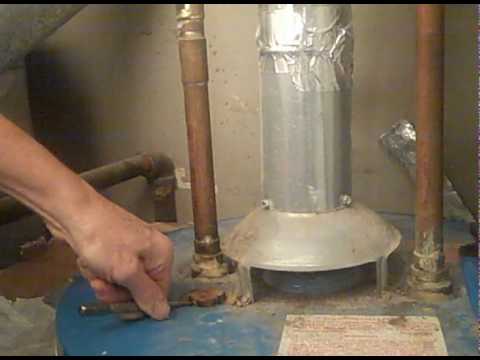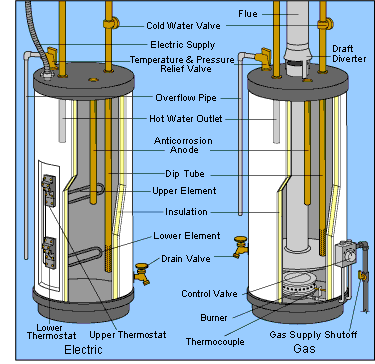Imagine stepping into a warm shower on a chilly morning, only to find that your water heater isn’t working properly. Water heater issues can be frustrating, and one common culprit is a leaking anode rod.
If you’ve noticed water pooling around your heater or a drop in water temperature, the anode rod might be the reason behind these problems. You might be wondering what an anode rod is and why it’s causing a leak. Understanding this could save you from costly repairs and extend the life of your water heater.
Keep reading to learn how you can identify and fix this issue before it turns into a bigger headache.
Page Contents
Causes Of Anode Rod Leaks
Corrosion often causes water heater anode rod leaks. Over time, the rod wears down, leading to leaks. Improper installation or poor-quality rods can also contribute. Regular checks can help prevent this issue.
Corrosion Issues
Anode rods protect your heater from rust. They wear out over time. Corrosion makes rods weak. Water can then leak through. Regular checks help prevent damage. Replace rods before they corrode too much.
Installation Errors
Incorrect installation can cause leaks. Misalignment or loose fittings are common problems. Always follow the instructions. Hiring a professional ensures correct setup. A small mistake can lead to big leaks.
Material Defects
Some rods have material defects. These defects make them prone to leaks. Inspect the rod for visible faults. Choose high-quality materials for your water heater. This reduces the chance of leaks.
Identifying Leak Signs
Brown or yellow water can mean a problem. Rusty water often shows a leaking anode rod. This part keeps your tank safe from rust. If the water changes color, check it soon.
Strange sounds from your heater are a bad sign. Banging or popping noises can point to a leaking rod. The rod might be wearing out. These sounds mean action is needed.
Rust on the heater can be a big clue. Rusty spots around the heater show a leak. The anode rod might be failing. Check for rust often. It helps in spotting problems early.
Immediate Action Steps
First, locate the main water valve. It is usually near the heater. Turn it off. This stops more water from leaking. Ensure the valve is closed tight. Water flow should completely stop.
Connect a hose to the drain valve. Lead it to a safe drainage spot. Open the valve carefully. Let the water flow out. This makes checking the heater easier.
Remove the heater’s top cover. Look for the anode rod. It is usually at the top. Check for any damage or corrosion. A worn-out rod might need replacing. Ensure it is in good shape for the heater to work well.
Temporary Fix Techniques
Apply sealant to stop the leak. Clean the area first. Dry it well. Use a water-resistant sealant. This helps keep it sealed. Spread the sealant around the leak. Wait for it to dry. Check for leaks again. If no leaks, the sealant worked.
Plumber’s tape can help seal leaks. Wrap tape around the leak. Make sure it is tight. Overlap the tape for best results. This stops water from leaking out. Replace the tape when needed. Check the tape often. It might need fixing.
Patch kits can fix the leak quickly. Find the leak first. Cut the patch to size. Place the patch over the leak. Press it down firmly. Wait for it to dry. Check if the leak stops. Patch kits are easy to use. Good for quick fixes.
Replacing The Anode Rod
Picking the correct anode rod is vital. Magnesium rods are common. Aluminum rods work well in hard water. Check your water type first. Choose wisely for long-lasting results.
Begin by turning off the heater. Drain some water from it. Locate the old rod. Use a wrench to remove it. Install the new rod. Make sure it fits snugly. Tighten properly to avoid leaks.
Always turn off electricity first. Never rush the process. Use gloves to protect hands. Watch out for hot surfaces. Ensure the area is dry. Check for leaks after installing.

Credit: www.appliancevideo.com
Preventive Measures
Regular maintenance keeps the water heater working well. Check the anode rod every year. It helps stop leaks. If it looks worn, replace it quickly. Clean the tank to remove sediment. This makes the heater last longer. Flush the tank every six months. It helps prevent rust and leaks. Follow these steps to keep your heater safe.
Test water quality often. Hard water can harm the heater. Check for minerals in the water. Too many minerals cause rust. Use a water softener if needed. It helps protect the heater. Clean water keeps the heater safe and strong. Testing helps catch problems early.
Hire a professional to inspect the heater yearly. They find hidden issues. Experts know what to look for. They check all parts of the heater. Professional help keeps your heater safe. They give advice to prevent leaks. Follow their suggestions to avoid problems.
When To Call A Professional
Some leaks are tricky. Water might drip from hidden parts. Pipes and connections can confuse you. A professional can find the leak fast. They have special tools. They know where to look. This saves time and stops more damage.
Fixing the same leak again is frustrating. It could mean a bigger problem. Anode rods might be worn out. Or there could be rust. Professionals can check these problems. They know how to fix them for good.
Many water heaters have a warranty. Fixing things yourself might void it. If you call a professional, the warranty stays safe. They can also check for other warranty-covered issues. Always check your warranty terms first.

Credit: www.wikihow.com

Credit: www.fixmyleaknow.com
Frequently Asked Questions
What Causes An Anode Rod To Leak?
An anode rod may leak due to corrosion or improper installation. Over time, it deteriorates, creating holes or cracks. This can lead to water leakage. Regular inspection and timely replacement can prevent leaks. Ensuring the rod is properly sealed during installation is crucial to avoid potential water damage.
How Do You Identify A Leaking Anode Rod?
Look for water puddles near the water heater. Inspect the anode rod area for moisture. Rust or corrosion signs around the rod can indicate leakage. Regularly checking these signs can help catch leaks early. Prompt action can prevent further damage to your water heater system.
Can A Leaking Anode Rod Be Repaired?
A leaking anode rod usually needs replacement rather than repair. Once it corrodes, its protective function diminishes. Replacing the rod can prevent further damage to the water heater. Regular maintenance ensures the longevity of the heater and reduces the risk of leaks.
How Often Should An Anode Rod Be Replaced?
An anode rod should be replaced every 3 to 5 years. However, this can vary depending on water quality. Regular inspections can help determine its condition. Replacing it timely ensures the heater remains protected from corrosion. This practice extends the lifespan of your water heater.
Conclusion
A leaking anode rod needs quick attention. Ignoring it can cause damage. Regular checks help prevent costly repairs. Replace your anode rod if it’s worn out. This ensures your water heater works well. Extend its life with simple maintenance. Protect your home from leaks and rust.
Keep an eye on any unusual signs. Remember, a little care goes a long way. Your water heater stays reliable and efficient. Enjoy hot water without worries. Stay proactive with your water heater’s health. Simple steps save time and money.
Keep your home safe and your heater running smoothly.
